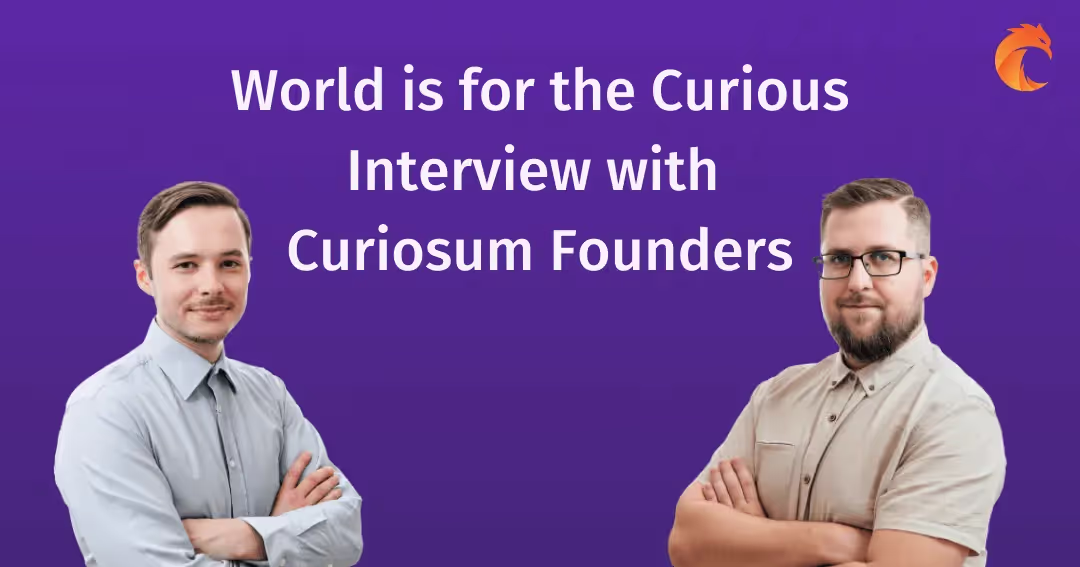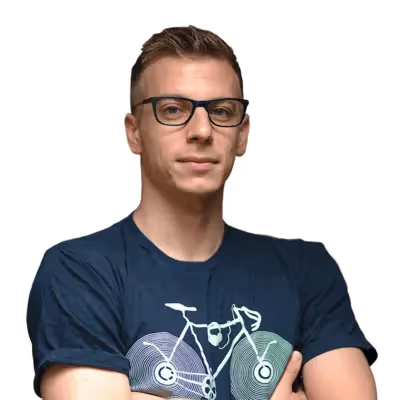World is for the Curious - Interview with Curiosum Founders


Curiosum is a brainchild of two guys - Szymon and Michał. What made them leave their cozy corporate desks and put it all on the line to build their own software house? I sat down with them for a quick interview about their story and aspirations.
Why leave it all and jump head first into your own business?
Szymon: Running a business was my dream and ambition for more than a decade. After working in small, medium and large companies I knew I learned enough to try. Now, with Michał, we have all we need to do it on our own terms.
Michał: For me it’s about agency as well, the taste of being in charge of something awesome. I came to the point at which I no longer felt fulfilled by just being someone who knows all the ins and outs of projects I worked on. I craved creativity, and now we and our team can flex our brains a bit more.
This was an evolution of mine - years ago I thought I want to be the best craftsman possible, only later I grew to understand there is more to development than awesome and clean coding.
You are both experienced developers. But how did it all start?
M: I was a little cyber-freak. You know, robot costumes as a child, stuff like that. IT was an obvious choice for me.
SZ: Completely the opposite here. As a teen, going to high school, I was like “jeez, I hope I will not become a nerd” and hated the thought of IT classes. Well, and here I am, a fully grown professional nerd.
M: We met during our IT degree at Poznań Technical University. I had a brief moment of love for Java, interned at Comarch. During workshops by Netguru - where Szymon worked for a while - and from later studies in distributed systems, my interests moved to functional programming and stayed there for good.
SZ: Michał could be a nefarious dude in university - he routinely broke into computers in a lab next door to turn them off. He did that to me a couple times.
I worked for a while at Nokia, did a couple months at Netguru, and then worked for a couple of years in Prograils - a Poznań-based software development company. In the meantime, two hard years went into my first startup. Hell of a lesson in business and self-sufficiency.
What was the startup about?
SZ: It was an app for discovering local events, basically. We had a great run, built a clever API to scrape data and made it work well. Had a decent user base. The problem? As you can guess, we built a great thing without an idea how to monetize it. I was unable to build a business model to fit an app that we created. Big, big mistake. Learned a lot from that.
Didn’t you guys fear another flop?
M: Not as much.
SZ: We prepared.
M: There is always some risk, personally. In the time I spent building up Curiosum I could maybe learn to be an even better developer, or learn the piano. There is always give and take. What I still fear is recruiting - Elixir is a fantastic technology, it will only grow in popularity - but finding specialists that are ready to jump into a project from day 1 is a challenge.
SZ: We want to compete with the best, and our advantage is also in technology. We have to have high standards because of this.
Classic question - what or who inspired you in your business path?
M: Maybe not inspired by, but I am curious about rulebreakers. You know, not every rule should be broken, and some rulebreakers break rules for egotistical reasons. Look at Linus Torvalds - on one hand he built something truly awesome. On the other, he has a history of being a jerk just for the sake of it. How to judge such a guy? How would Curiosum work with a rule breaker like that? That’s an interesting challenge for me.
SZ: A bit of cliché but I got inspired by tech giants, like Elon Musk, Steve Jobs and Bill Gates. They are less than perfect, but tuned my brain to dream big. Other than that, books. One of the crucial ones on my path was Principles by Ray Dalio. Main takeaway was to let others, your team members, be smarter than you - Dalio recounts his business failings, which invariably were caused by him not listening. I know that Bridgewater Associates (his investment company) has some issues with being faithful to those values of radical transparency, but still, I am now vigilant to let others show me faults in my thinking.
What is next for Curiosum?
M: Oh, we are ambitious. But a classic understanding of “ambitious” probably leads you to think its money and growth, growth, growth. We want to be smarter than that, we want to put relationships first.
SZ: We can already compete technologically with the top software houses in the region, maybe on a bit of a smaller scale. But that is an advantage, too. We are nimble, we adjust easily, and we want to stay this way. It just works for clients this way.
M: Before starting Curiosum, we worked together for a couple of years in a mature software development company. Did app development, e-commerce, telehealth, entertainment, really varied projects. We want more of those challenges. And we are ready.
Ready to scale your business with the right tech partner?
Related posts
Dive deeper into this topic with these related posts
You might also like
Discover more content from this category
Technology and education seem inseparable now, and they've changed the way people start learning. 2021 proved the importance of eLearning. By 2026, the global eLearning market should be worth $375 billion! Check eLearning challenges for 2022-2026
A new application or website is something your company needs to evolve. First, consider whether creating an in-house team or hiring professionals is better for your business.
If you're in the business of developing mobile or web apps, then you're probably constantly on the lookout for ways to make your app more successful. App scalability should be one of the most important factors to take care of.




